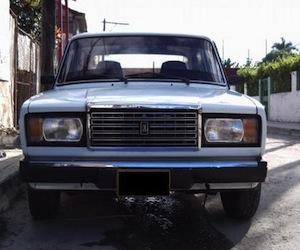Russian parts carried to Cuba
- Submitted by: lena campos
- Business and Economy
- 02 / 13 / 2013

Somewhere on the streets of Havana is a cherry-red Lada car rebuilt almost entirely with parts that arrived from Miami in a visitor's suitcases.
A year ago, the 20-year-old Russian-made automobile -- a boxy but remarkably durable model -- was in dire need of repair. The door handles were rusting, the tires on their last mile, the inner workings shot.
"It was in very bad condition," said Frank Torres, a Cuban-American living in Miami whose cousin owns the car back in Cuba.
Torres decided to help overhaul it. But he and his cousin either couldn't find the parts they needed in Cuba or encountered exorbitant prices.
So Torres turned to a Russian auto parts store that recently opened in Hialeah, in a pocket of Miami-Dade County filled with cheap clothing stores and gas stations that sell freshly brewed cafe con leche.
There, businessman Fabian Zakharov is tapping into a niche market: Cuban-Americans, mostly recent arrivals in this country, who frequently go back to visit relatives on the island and bring food, toiletries and car parts.
In more than a year since the store opened, Zakharov said, he has sold parts for hundreds of Ladas and some Moskvich cars, the two Soviet-era vehicles that are mainstays on Cuban roads.
Despite the U.S. trade embargo that has been in place against the communist island since the early 1960s, what Zakharov and his customers are doing is legal and aboveboard. He is not exporting to Cuba; he is selling to customers in the U.S. like any other business. Those customers can send or take products to Cuba, subject to certain limits.
It's one more example of the growing economic links between the U.S. and Cuba, political adversaries still intricately connected by those who left and those who stayed behind.
The average Cuban worker is paid about $20 a month, making buying a new car impossible for most. Because of that and the trade restrictions, the streets of Havana are an automotive time capsule, filled with bulbous, tail-finned Detroit models from the pre-revolution 1950s and dowdy vehicles from the Cold War.
"This store is wonderful," said Alexis Reyes, a Cuban who has been living in Miami for two years and recently bought a part for a 30-year-old Russian car his son drives back on the island. "It means those of us living here can buy the parts to maintain the cars of our family in Cuba."
Ladas began arriving in Cuba in the 1970s, when the country was closely allied with the Soviet Union. Many were doled out strategically to doctors, diplomats and sugarcane cutters who met production targets. Cubans who served on overseas missions and came back with hard currency were often allowed to buy them.
While they are slowly being supplanted by Chinese and South Korean models, Ladas are now commonly used as police cars, taxis, government and military vehicles, and family cars.
Zakharov, who was born in Russia but grew up on the island, learned how to drive in one of two Ladas his parents own -- a beige one that has more than 125,000 miles on it. He would drive his father, a university professor, to work.
Zakharov recalls traveling throughout Cuba, rarely having any trouble with the car. The only problem was the high price of gas.
"They call it the worker's car," Torres said. "Because it's tough."
It's commonly said the Lada is the perfect car for Cuba: No matter where you break down, you can immediately find a mechanic who knows how to fix it. Parts are generally easy to find but pricier than they are in Florida.
Zakharov, who immigrated to the U.S. six years ago, said the idea for the auto parts business occurred to him when a friend in Cuba needed help in finding an original Lada brake pump. The only place Zakharov could locate one was Russia.
He eventually traveled to Russia and signed contracts for tons of parts. His store is now stocked with everything from screws and valves to seats and dashboards.
Their ultimate destination is most often Cuba, since in the U.S., there are few Ladas. Even in Miami, a place with great nostalgia for all things Cuban, there appears to be only one: A Cuban barber uses it for advertisement outside his shop.
Under the Obama administration, restrictions have been lifted on the number of times Cuban-Americans can travel to visit relatives on the island.
Auto parts can be brought in under a Cuban government point system: There is a limit of 200 points per person receiving shipped items and a 1,000-point limit for those bringing items themselves on a visit to the island. A trailer to attach to the back of a car is 100 points, while a light bulb is 20.
Source: www.freep.com
Comments